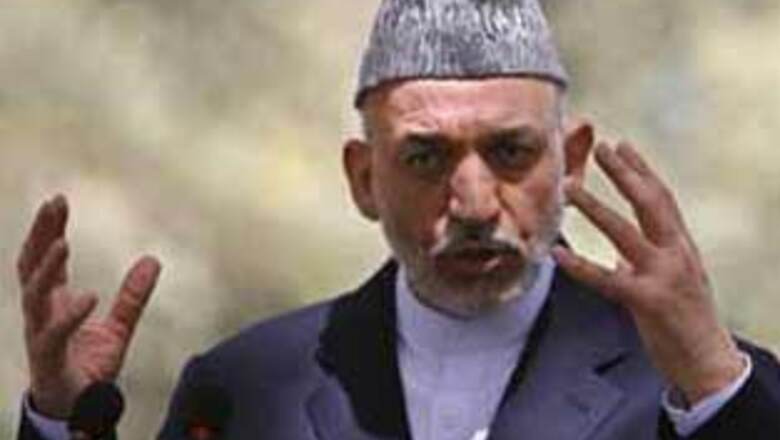
views
Kabul: He was once the toast of the town, a charming, urbane Afghan tribal leader voicing Jeffersonian ideals in perfect English, gliding effortlessly through the halls of power in Washington and the baking tents of the Afghan desert.
Since his rise in 2001, President Hamid Karzai's image has changed. Western critics now accuse him of weak leadership, cutting deals with warlords, tolerating drug smugglers and ignoring rampant corruption that has fed the Taliban insurgency.
Despite his critics both in Afghanistan and abroad, the 51-year-old Karzai appears the favorite in Thursday's presidential election, although a late surge by his chief rival, former foreign minister Abdullah Abdullah, could force a runoff if none of nearly 40 candidates wins a majority.
Karzai's alliances with regional powerbrokers and his origins as a Pashtun, the biggest Afghan ethnic community, have placed him in a strong position despite widespread public dissatisfaction with the government.
A survey funded by the US-funded International Republican Institute and released on Friday shows Karzai leading a field of three dozen candidates with 44 per cent, against 26 per cent for his closest rival. If neither wins 50 per cent, a run-off will be needed.
The prospect of a second five-year term for a wartime president widely seen as ineffectual and indecisive is greeted more with resignation than enthusiasm among Western governments that were once Karzai's strongest champions and helped engineer his rise to power after the US-led invasion overthrew the Taliban in 2001.
US Secretary of State Hillary Rodham Clinton said last week that the US would work with "whomever the people of Afghanistan select" but would be "very specific about what we need to see coming" from the next administration — including effective local governance and a vigorous campaign against corruption.
Karzai dismisses many of the Western complaints about his leadership, saying the West would prefer a compliant Afghan leader to one who challenges his international partners publicly on such issues as airstrikes, civilian casualties and imprisoning Afghans without charge.
"When Hamid Karzai was quiet and there was no trouble between us, Hamid Karzai was a good man," he joked during an interview last month with The Associated Press. "And now that there is a little trouble, he's a bad man."
James Dobbins, who served as President George W Bush's first envoy to Afghanistan, believes the personality traits that won Karzai praise when the war began are the same ones that he is faulted for now.
"Karzai is a conciliator and a unifier," Dobbins, now an analyst with the RAND Corp., told The Associated Press. "He's not the kind of decisive and energetic figure who can push through controversial programs and discipline fractious or corrupt supporters."
PAGE_BREAK
Although Karzai himself has not been accused of corruption, allegations that his younger brother Ahmed Wali Karzai is involved in the drug trade have circulated in Kabul for months. The younger Karzai denies the allegations.
Karzai's decision last April to pardon five convicted drug leaders, including the nephew of a close political ally, enraged Western officials working to combat drug trafficking and was seen as a bid to draw votes.
Criticism of Karzai stands in marked contrast to the adulation that surrounded his rise from obscure Afghan exile living in Pakistan to the leader of an impoverished nation devastated by a generation of war.
Karzai, the son of a Pashtun tribal chief, broke with the Taliban after he became concerned the movement was falling under the influence of foreign Islamic extremists such as al-Qaida. He refused an offer to become the Taliban-government's UN ambassador and moved to Pakistan in 1995.
His father was assassinated in 1999, purportedly by Taliban agents, and he became leader of the half million-strong Popolzai, a Pashtun tribe.
After the 2001 invasion, Karzai was one of the few Pashtun exiles to organize resistance to the Taliban from inside Afghanistan, a move that nearly cost him his life when his party was struck by a US bomb in a friendly fire incident and three US Special Forces soldiers traveling with him were killed.
Karzai was chosen at an international conference in Germany in December 2001 to lead a transitional post-Taliban administration, and won a full five-year term in an election three years later.
He seemed so well-suited to his role that in the early years of the Iraq war, as they struggled to find a credible replacement for Saddam Hussein, US officials used to say they needed "an Iraqi Hamid Karzai."
All that changed with the Taliban resurgence, the burgeoning Afghan opium industry and allegations of corrupt government.
Karin von Hippel, of the Center for Strategic and International Studies, believes some critics are too quick to blame Karzai for mistakes committed by the U.S. and its allies, that diverted resources from Afghanistan to Iraq after Taliban rule collapsed in 2001.
"We have a lot to answer for in terms of the short-term gains versus long-term objectives," von Hippel said.













Comments
0 comment